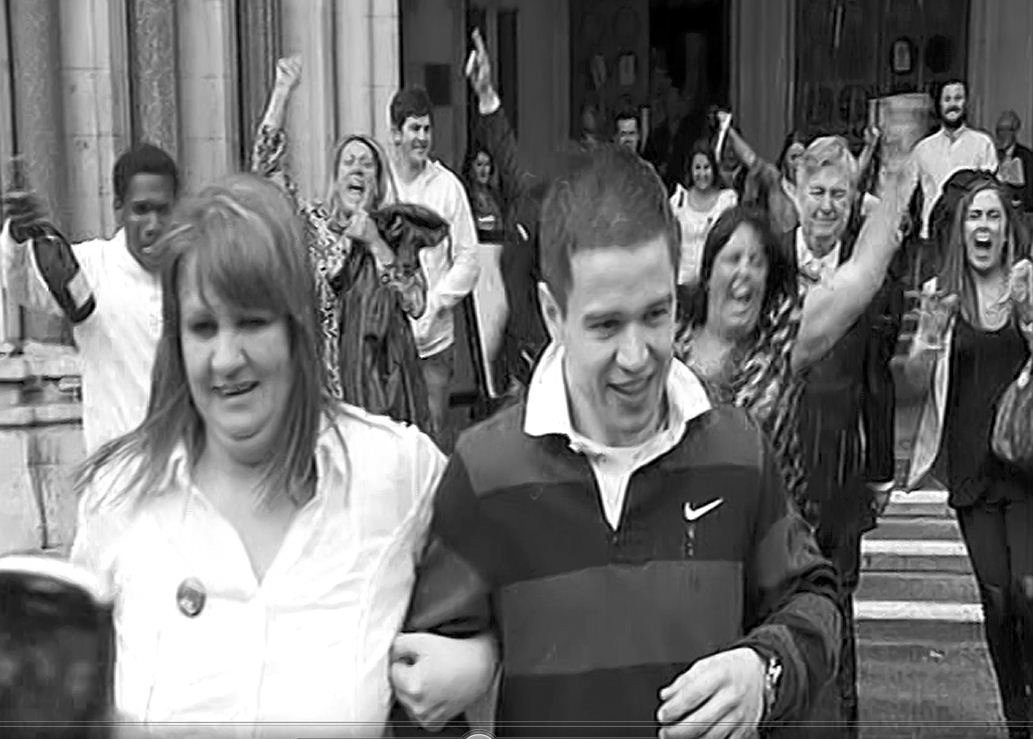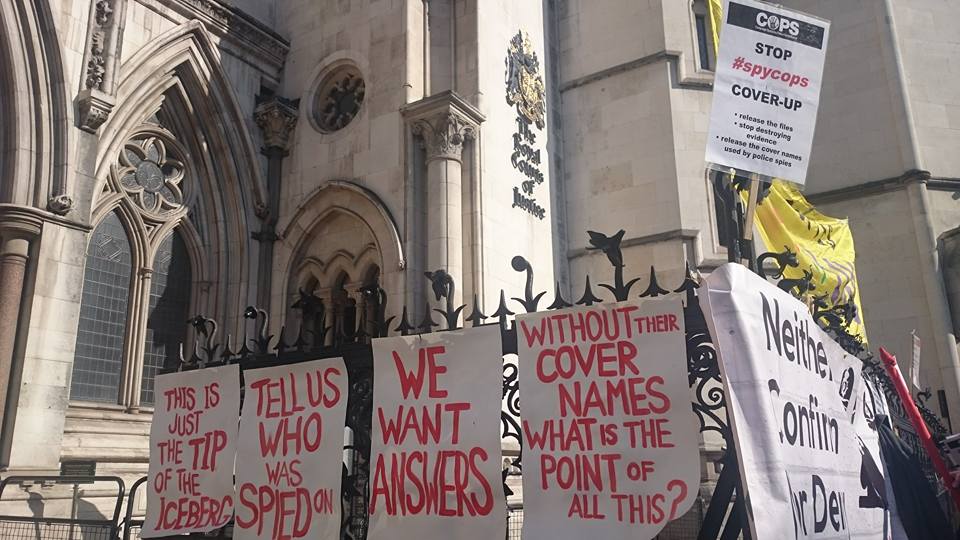REPORT: Sam Hallam was ‘the victim of a serious miscarriage of justice’, writes Kim Evans. So said Henry Blaxland QC in his opening address to the Court of Appeal today. According to the barrister, representing the Hallam family, such a judicial blunder was brought about by unreliable identification evidence; the apparent failure of his alibi and the failure of the police to properly investigate that alibi; and non-disclosure of material.
The court was packed today with Hallam’s family and supporters. When the court resumed after lunch with an announcement by the prosecution that they ‘would not be opposing the appeal’, there were a few seconds of stunned silence as family and supporters double-checked to make sure they understood what had just happened – that Hallam, an 18 old year old when jailed for life seven years ago – would walk out a free man. Then there was pandemonium.
‘I will not have my courtroom turned into a circus,’ warned Lady Justice Hallett. She did however enquire – very kindly – of Hallam as to whether he understood what was happening, and why the hearing needed to continue, asking if he was OK to carry on. He said ‘Yes’ he was in a very shaky voice.
Sam Hallam was told he would be bailed overnight, before returning to hear the court’s judgment at 12 o’clock tomorrow.
It was standing room only in courtroom 8 – all seats in the court and public gallery were taken – as supporters listened had to Henry Blaxland talk the court through the details of Hallam’s appeal against his conviction for murdering chef Essayas Kassahun in Clerkenwell in 2005. Hallam always maintained that he was not present at the scene of the killing.
Hostile witness
The argument in the morning session of the hearing largely focused on the identification evidence given during the original trial. According to Hallam’s defence team was so manifestly unreliable that a submission of no case to answer at his trial should have been allowed. The appeal court judges were keen to investigate how the identification of Hallam as being present at the killing came about. It became clear to all that the witnesses’ evidence was tainted.
Both witnesses subsequently accepted during the trial that they were unsure of their evidence. One said: ‘I was just looking for someone to blame on the spot’. The other was treated as a ‘hostile witness’ after he said: ‘He’s the only white boy I know, but I’m not sure it was him anyway.’
Fresh evidence, a requirement for most cases referred by the Criminal Cases Review Commission, to the Court of Appeal, had also been discovered during the CCRC and Thames Valley Police’s reinvestigation into the case. Evidence to say that Hallam was not present at the attack; evidence from previously undisclosed documents that there were rumours that a different Sam was involved in the crime; evidence that another named person was present and in possession of a weapon; and finally evidence from Hallam’s own mobile phone showing his whereabouts on the evening (which backed up the mistakenly erroneous alibi he had given to police). Most importantly, there was new evidence available, supported by an expert image analysis expert to show that a person bearing a similarity to Hallam was seen in CCTV footage taken in the surrounding area shortly before the killing took place.
There were numerous other failings in this case which compounded the unreliable identification evidence, failures in disclosure and investigation by the prosecution to the extent that Sam Hallam was deprived of a fair trial.
In referring the case to the Court of Appeal, the CCRC found that the new evidence ‘further undermined the already fragile basis for the appellant’s conviction and was therefore sufficient to render the conviction unsafe’. More than that, said the report, ‘there is a body of evidence to lead to the firm conclusion that, as the appellant said from the moment he was first arrested, he was not present at the scene of the crime and is innocent of the offences of which he was convicted.’
Bitter experience
An extensive investigation by Thames Valley Police has uncovered no new evidence to link Hallam to the murder – in addition to the three witnesses who said that he was not present, a further 10 people told the investigation that Hallam was not there. There was no CCTV footage of Hallam in the area, and no evidence that he was in contact with the other defendants before or after the killing.
The court found it incredible that no investigation into Hallam’s phone was undertaken, an investigation of the cell site analysis which may have shown very early on that Hallam was not involved, and which could have led the police to conduct further enquiries which would have cleared him. New evidence from the phone showed that Hallam had forgotten that he was in fact in a public house with his father on that evening.
The CCRC and Thames Valley Police were sharply critical of the ‘failures by the prosecution properly to discharge its duty of disclosure at the time of the trial and to pursue all reasonable lines of inquiry, whether they point towards or away from the suspect’.
The report concludes with a citation from Lord Bingham’s speech:
‘Bitter experience has shown that miscarriages of justice may occur, when such material is withheld from disclosure.’
The criticism often leveled at the CCRC is that it ‘doesn’t care about innocence’ – not so Hallam’s case review manager. He was clearly deeply moved at the Appeal court’s ruling as he left the court.
Outside, I spoke to an emotional cousin of Hallam who told me of the terrible toll Sam’s conviction had taken on the family. With tears in her eyes she told me that Sam’s father had committed suicide because of the pressure of the case. When he did eventually leave the court Sam was surrounded by members of his campaign, who have every reason to feel extremely proud of the work they have done, together with Sam’s legal team, the CCRC, and Thames Valley Police to get this case back to the Court of Appeal, and finally to have the conviction overturned. It’s now shockingly clear that he should never have been convicted in the first place.






